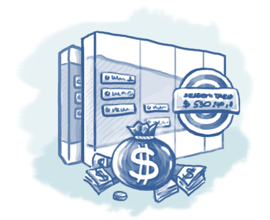Part of the debate over the move to a cloud CRM solution centers around costs. Since data hosting costs comprise a significant portion of any company’s budget, it well behooves an organization to research this point thoroughly and learn the whole truth of the matter: is it more cost-effective to retain data resources on-site, or to move to the cloud?
There are many fiscal arguments in favor of a cloud CRM solution – and more are in the works. There is currently a price war between Google and Amazon, resulting in substantial reductions in the prices of cloud services.
But more fundamentally, here are 5 general cloud CRM cost benefits to help you answer the overall question for yourself.
#1: Hardware Infrastructure
The considerable cost differential on hardware infrastructure between on-site and cloud is probably the most compelling argument in favor of the cloud. For a business with an in-house data center, there are servers, storage devices, routers, cabling, air-conditioning, hardware footprint (physical space) and many other factors to take into account. In the small to medium business SMB category especially sales startups, the often substantial upfront costs associated with hardware are totally eliminated, replaced with the comparatively low monthly fee for use of the cloud infrastructure.
#2: Maintenance, Staff and Operational Costs
While an argument might be made that over the long term outright hardware purchase would be less expensive—once the hardware is paid for, it’s paid for—there are often hidden costs to take into account. For example, there are installation costs, including trained IT staff or consultants. Hardware requires maintenance, which requires IT staff trained for that purpose, or maintenance contracts with outside companies. There are parts such as hard drives that wear out and need to be replaced. Then there is the fact that in this age when development is rapidly pushing the limits of technology, hardware can become quickly outmoded; your company will want to be equipped with the fastest processors, the latest and most efficient in storage devices, and other innovations that for cost reasons must often be passed up by SMBs.
A cloud provider has a vested interest in rendering the best possible service and will have an often state-of-the-art hardware infrastructure that you could never afford on your own—your use of which is covered by your low monthly fee. And with your IT infrastructure in the cloud, you can put that considerable on-site data center space requirement to more effective use.
#3: Costs of Software
In the software category, once again it could be said that an upfront purchase might be less expensive than the software subscription model, which is utilized with a cloud CRM solution. But in this case, the cost advantages are even more obvious than in the case of hardware.
Once the software is purchased, it must be deployed across an organization. This takes IT staff and man-hours and debugging if for some reason there are software conflicts. With a cloud CRM solution, you simply pay for your subscription and begin using the software.
#4: Software Upgrade and Update Costs
Then there is the issue of upgrades and updates. Software becomes obsolete much more rapidly than does hardware—how often are you hearing about new versions of applications you just installed a month ago? Upgrading software is costly not only in terms of paying for the upgrades and updates themselves, but then there are the IT man-hours it takes to get them installed and functional.
With a cloud CRM solution, you never need to worry about upgrades or updates; the latest versions are always installed without your company ever having to worry about it. You are always utilizing the latest version.
#5: Cloud CRM Solution Implementation and Training Costs
Once a CRM solution is deployed, implementation becomes a priority; if the CRM solution is not fully utilized, its ROI (return on investment) is going to be negligible.
Over the years there have been numerous issues associated with CRM implementation—not the least of which has been the training of the sales force and the remainder of the staff who must use it. Training often required weeks or months, with IT staff dedicated at least part-time to this task the whole while.
Choosing the right cloud CRM solution means the sales force—and any other relevant employees—can be trained in hours, not weeks or months. Not only are you staff up and running rapidly, reaping the benefits of CRM, but your IT staff can worry about more important matters and your sales pipeline and opportunity management doesn’t suffer.
In conclusion, you must obviously weigh the advantages of a cloud CRM solution for your own company. But you will likely find the advantage is clearly in the cloud.
How could a cloud CRM solution benefit your company? Find out by signing up for one of our free webinars.











